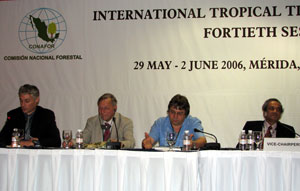Progress is being made towards ITTO's objective of sustainable forest management, according to a report released at the International Tropical Timber Council, which has been meeting here this week.
The Council is the governing body of the International Tropical Timber Organization (ITTO). It meets regularly to discuss a wide-ranging agenda aimed at promoting sustainable tropical forest management and the trade of sustainably produced tropical timber.
According to the ITTO report Status of Tropical Forest Management 2005, at least 25.2 million hectares of permanent production forest, and 11.2 million hectares of permanent protection forest, are now under sustainable management. This compares with almost zero in the first survey conducted by the Organization in 1988. The Council heard that while progress is being made, less than 5% of the total permanent forest estate in the tropics is known to be under sustainable management.
Delegates were able to quiz a panel of tropical forestry experts comprising Dr Duncan Poore, Dr Jurgen Blaser, Dr B.C.Y. Freezailah and Dr Steven Johnson on the findings of the report and their implications for tropical countries and the international community. The full report, which includes in-depth profiles of ITTO's 33 producer member countries, is available at www.itto.or.jp.
The Council financed a number of new projects during the session to further promote and contribute to the sustainable management of tropical forests. The problem of shoot-borers in timber plantations in Mexico's Yucatan Peninsula and state of Veracruz will be addressed by one project, while the management of mangrove and flood forests on the central coastal plains of Veracruz will be tackled by another. Guyana's Iwokrama forest benefited from the financing of a project to promote sustainable management there, and the Philippines will receive assistance to implement a forestry information system. A project in Indonesia will assist in the monitoring of concession forest management performance; an African regional parliamentary conference on the sustainable management of Central African forest ecosystems also received funding.
The total amount of funds allocated at this session was US$3.9 million. Major donors at the session were the governments of Japan and the USA, while the Common Fund for Commodities, the Friends of Iwokrama and the governments of Norway, Finland, France, Australia and the Republic of Korea also pledged funds. A summary of all the projects financed at the session will be available at www.itto.or.jp in a few weeks.
ITTO's Annual Market Discussion was convened during the session on the topic of tropical timber procurement policies in consumer countries. Rupert Oliver, a UK-based tropical timber trade analyst, reported that Europe's public procurement policies are moving rapidly towards requiring evidence of legality and sustainability. He expressed concern about the lack of harmonization between the policies of different authorities and countries, which could lead to major market inefficiencies. The Discussion also received presentations on public and commercial procurement policies in Denmark, France and the USA.
Several side-events were convened during the session. The Council's Civil Society Advisory Group organized a panel of local-community leaders in Mexico, Guatemala, Nicaragua and Panama to speak about the challenges facing community forest enterprises in the region. Marcedonio Cortave, from the Association of Forest Communities of the Petén (Guatemala), reported that access to international timber markets through certification had created additional benefits for his community. Several other speakers spoke of the problems facing communities in obtaining finance for their operations and called on the international community to address this issue.
At the same event the non-governmental organization Forest Trends presented the results of a study financed by ITTO, which found that relatively few countries have established tenure and forest policy environments conducive to the widespread development of community forestry enterprises.
Another side-event reported on the World Trade Organization's Doha Round of negotiations on trade and its possible implications for the forest products' trade. Sandra Ribey of the Government of Canada presented information on a proposal by a number of governments on a possible sectoral initiative in the Non-Agricultural Market Access negotiations on wood products, and Al Goetzl, a US-based consultant, presented the results of a study estimating the impacts of tariff reductions on wood products.
A third side-event canvassed the response of the private sector in Europe to changing consumer demand for wood products. An interesting aspect of the presentation was the explanation of how the private sector has increasingly taken the lead in organizing responses to changing consumer demand through mechanisms such as certification.
For more information on the Council session go to www.itto.or.jp.
Status of Tropical Forest Management report launched in Council
2 June 2006, Mérida, Mexico

Panelists present findings from the ITTO Status of Tropical
Forest Management report. Photo: ITTO